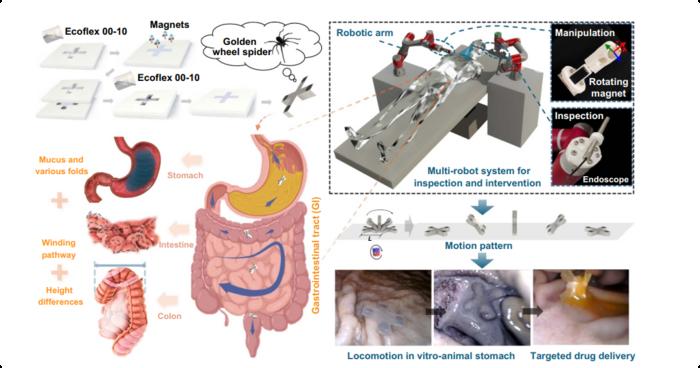
A team of researchers at the University of Macau has unveiled a tiny, spider-inspired robot that may reshape how doctors diagnose and treat diseases of the stomach and intestines. The soft, magnetically controlled robot can climb in any direction – even upside down – through the body’s most complex digestive landscapes, where traditional endoscopes can’t go.
Gastrointestinal (GI) cancers are among the world’s deadliest, and survival depends on early detection and precise treatment. Yet current endoscopes are rigid, often painful and limited in how far they can reach. The digestive tract poses extreme challenges: sticky stomach mucus, tight intestinal turns and height differences of several centimetres in the colon.
‘We asked ourselves: what if we could design a tiny, soft robot that moves effortlessly through the stomach and intestines, delivering therapy precisely where it’s needed?’ explained lead researcher Professor Qingsong Xu.
Endoscopes struggle with sharp turns, narrow passages and steep folds. Micro-robots, while promising, have also faltered in the hostile and varied terrain of the digestive system.
The team turned to nature for answers and found inspiration in the golden wheel spider, an insect famous for rolling across steep desert dunes. Mimicking this adaptability, their soft robot is made of magnetic materials and powered by external magnetic fields. A dual robotic arm system directs the robot’s motion while also providing real-time imaging, allowing physicians to see exactly where it travels.
In controlled experiments with animal tissues, the robot successfully traversed the stomach, small intestine and colon, showcasing its adaptability across environments where conventional tools fail. Researchers plan to refine the design for eventual in vivo trials, with the long-term goal of enabling painless, precise and highly effective diagnosis and therapy.
‘With such a robot, we may be able to reimagine how GI medical procedures can be performed,’ said Xu. ‘This technology could make diagnosis and treatment far more precise, painless and effective.’
If successful in clinical translation, the spider-inspired soft robot could offer physicians a powerful new platform to deliver therapies with minimal discomfort and unprecedented precision and redefine standards of gastrointestinal care.
The research has been published in the International Journal of Extreme Manufacturing.


